National Chinese Language Conference 2024
VIEW EVENT DETAILSMandarin Education in a Transformative Era
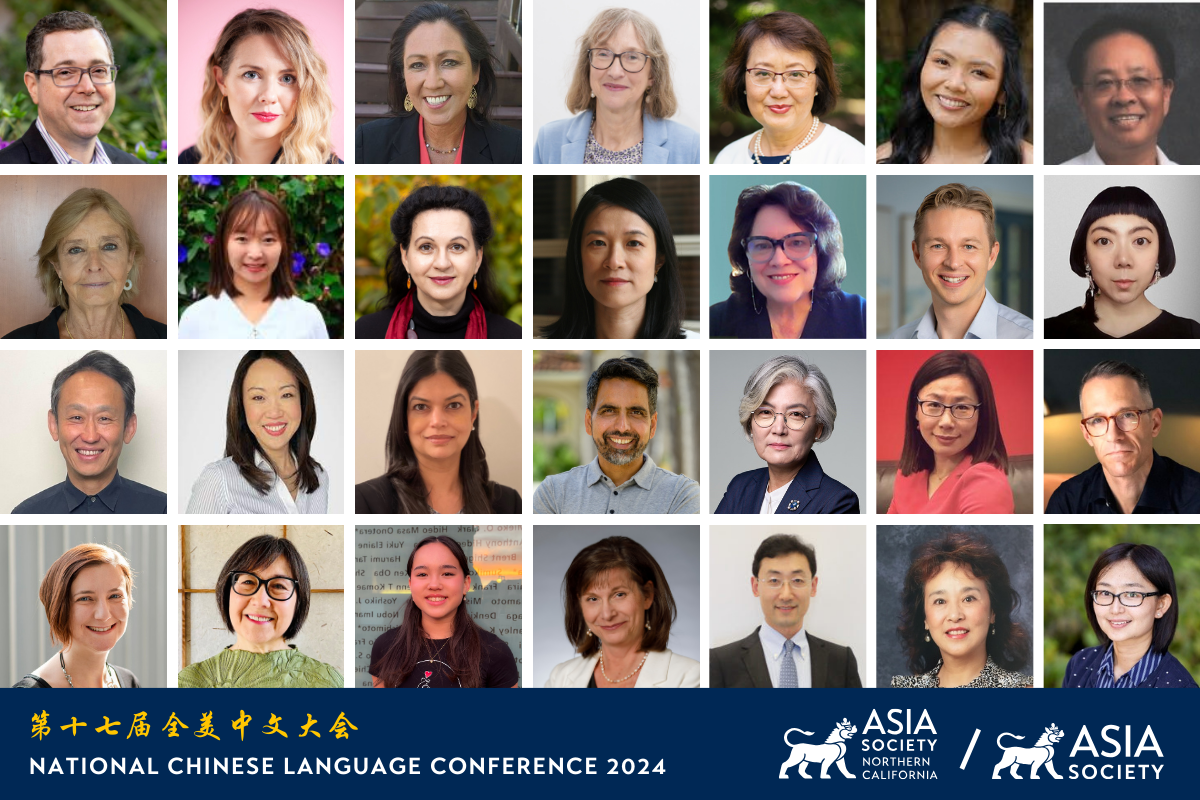
This year the 17th National Chinese Language Conference (NCLC) is coming to Silicon Valley on May 2, 2024! NCLC provides a high–profile platform for sharing new ideas and best practices in the fields of Chinese language teaching and learning, Chinese arts and culture, and international education exchange. During the past 16 years, the conference has grown into a tight-knit community of educators–attracting 17,800+ attendees from the United States and around the globe.
The theme of this year's conference is “Mandarin Education in a Transformative Era” with a special focus on reimagining education with the emergence of A.I.
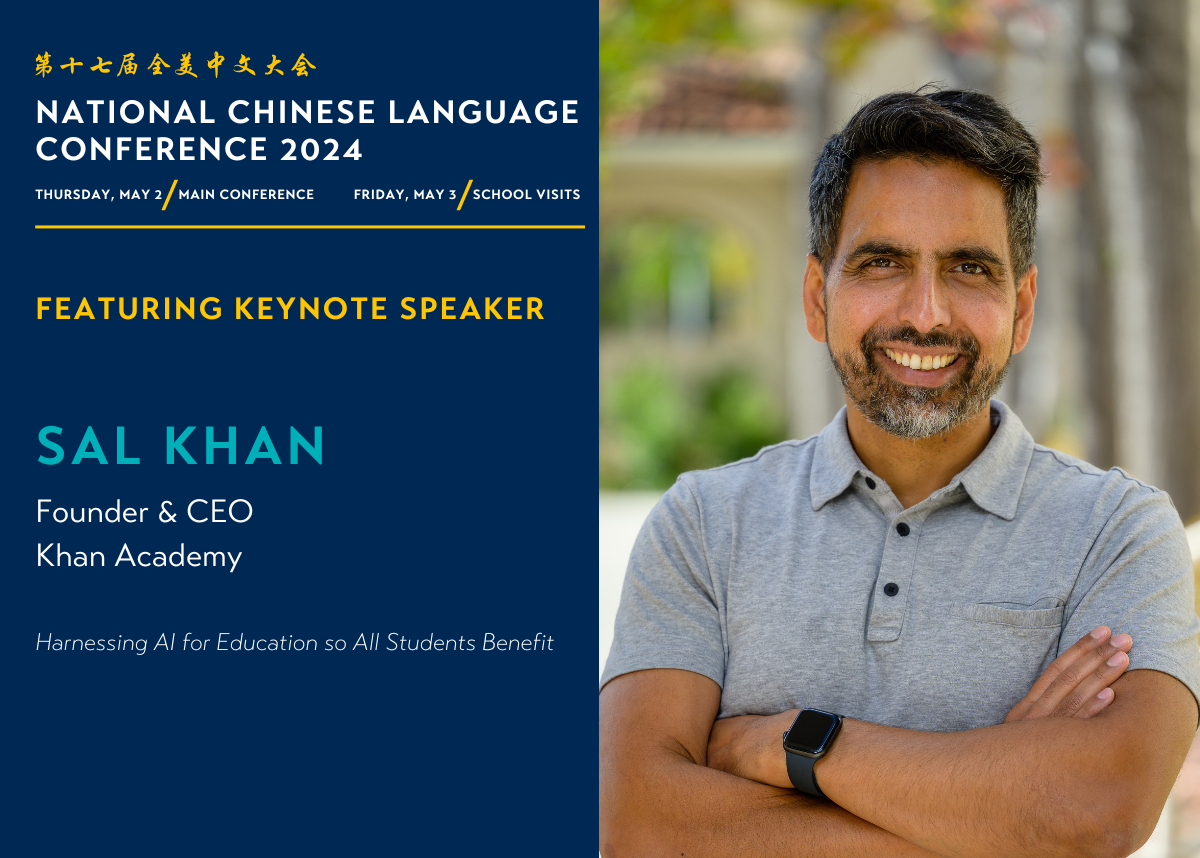
This year's keynote speaker is Sal Khan, CEO and Co-Founder of Khan Academy! He will share how to harness AI for education so all students benefit.
May 2 - Full-Day Conference:
- Hear from expert speakers and dive into cutting-edge topics at the intersection of education, technology, and culture.
- Network and build community with other professionals in the field.
- See the conference agenda here and below.
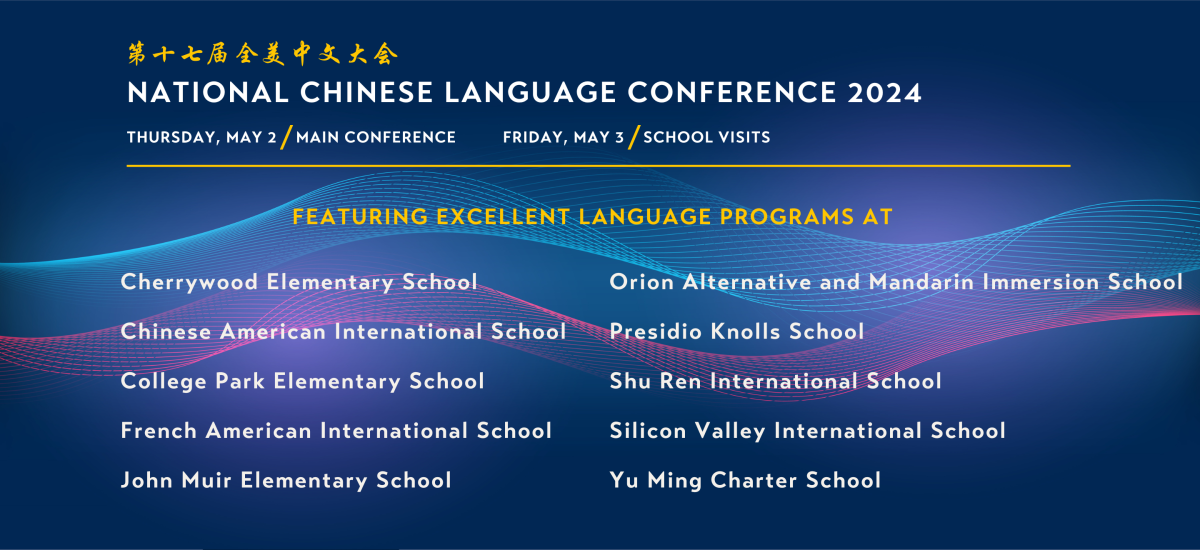
May 3 - School Visits:
- Visit innovative and accomplished Chinese language programs in the greater Bay Area featuring a variety of schools and PK-12 program models.
- Observe student learning firsthand with guided classroom observations.
- Hear school leaders and teachers share their vision and answer your questions.
- Find out more about school visits here. Spots are limited; sign up early to secure your preference.
Learn more about previous National Chinese Language Conferences here.
The NCLC 2024 is co-organized by Asia Society Education and Asia Society Northern California.
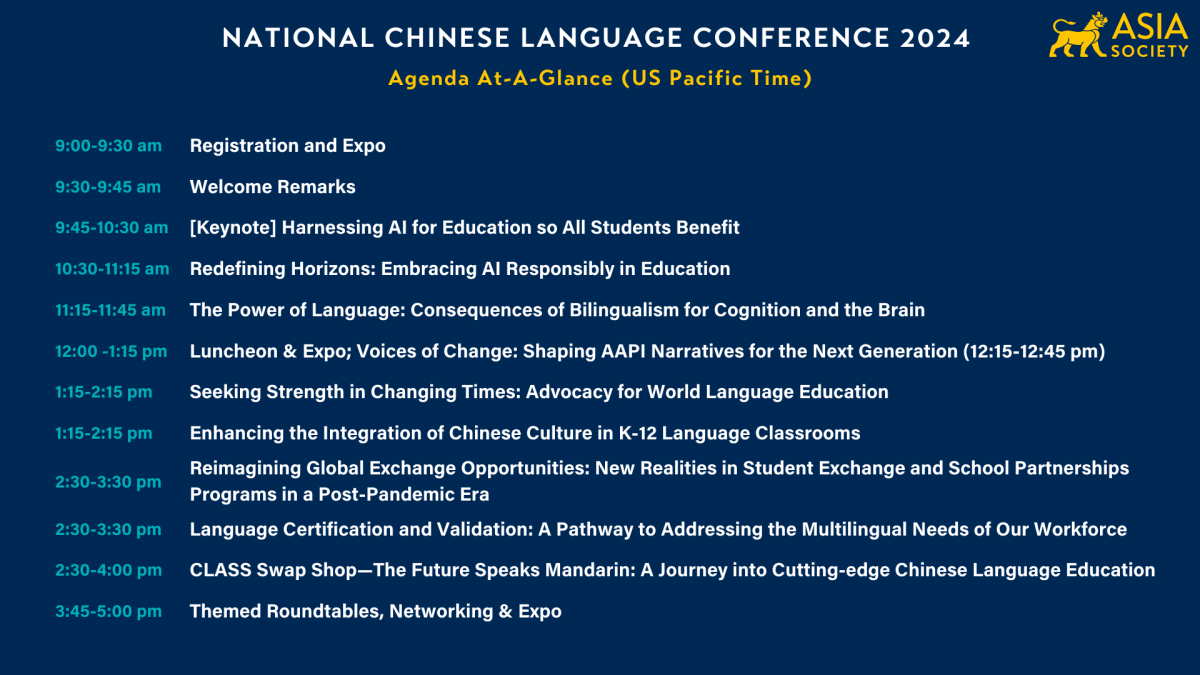
Main Conference Agenda
Date and Time: 9:00 AM – 5:00 PM Pacific Time on Thursday, May 2, 2024
Location: Computer History Museum, Mountain View, CA
Sessions & Speakers
9:00-9:30 am | Registration and Expo
Light breakfast and coffee/tea will be provided at the Expo area
9:30-9:45 am | Welcome Remarks
- Kyung-wha Kang, President and CEO, Asia Society
9:45-10:30 am | [Keynote] Harnessing AI for Education so All Students Benefit
AI is nascent technology, but we already find ourselves at a crossroads. Will we amplify AI's benefits equally across society? Or will we allow an AI gap to form that leaves some students out? Sal Khan, founder and CEO of the nonprofit Khan Academy, talks about the potential for AI to transform education. He’ll discuss his plan for using AI to help empower all students to reach their full potential and assist teachers so they can focus on the very human work of instructing a classroom full of kids. Imagine an entire generation activated, engaged and exploring new ideas, creating change bigger than any of us can imagine.
- Sal Khan, Founder and CEO, Khan Academy
10:30-11:15 am | Redefining Horizons: Embracing AI Responsibly in Education
Join us for a visionary panel discussion that delves into the pressing questions facing educators in the rapidly evolving age of AI: How can we leverage the transformative potential of AI to achieve learning goals while ensuring inclusive and responsible approaches? How can we adapt existing teaching and learning pathways to cultivate empowered young digital citizens? Industry experts will share pioneering initiatives and insights on how educators and institutions can productively and safely engage with AI technologies.
- Jonathan McKay, Head of Product, Growth, OpenAI
- Emily Reid, CEO, AI4ALL
- Yvette Renteria, Chief Program Officer of Common Sense
- Moderator: Jacob Ward, Technology Journalist
11:15-11:45 am | The Power of Language: Consequences of Bilingualism for Cognition and the Brain
Bilingualism and multilingualism have profound consequences for individuals and societies. Learning multiple languages changes not only how we use language but also how we perceive the world, what we remember, how we learn, our creativity, decision-making, and identity. The speaker will present eye-tracking, mouse-tracking, and neuroimaging evidence showing that multiple languages continuously interact in the mind, and will conclude with a call for placing the study of language-mind interaction and bi/multilingualism among the core areas of scientific investigation if we are to gain an accurate understanding of humanity’s potential.
- Viorica Marian, Professor, Ralph and Jean Sundin Endowed Chair, Department of Communication Sciences and Disorders and Department of Psychology; Director, Bilingualism and Psycholinguistics Research Lab, Northwestern University
12:15 -12:45 pm | Voices of Change: Shaping AAPI Narratives for the Next Generation
This fireside chat will delve into the multifaceted approaches taken by students and educators to integrate AAPI stories into broader narratives. By focusing on storytelling, the development of inclusive lesson plans, and creative educational methodologies, the panel will illuminate the pathways through which AAPI voices are being amplified. Attendees will gain insights into overcoming challenges, engaging communities, and leveraging educational frameworks to challenge stereotypes and broaden the narrative landscape.
- Mina Fedor, AAPI Youth Rising, Founder and Executive Director
- Giannela Gonzales, Project Coordinator and Curriculum Developer, The Asian American Education Project
- Moderator: Jennifer Kapral, Director, Education and Outreach, Asia Society Texas Center
1:15-2:15 pm | Seeking Strength in Changing Times: Advocacy for World Language Education
California has led the way for the nation on many fronts, and world language advocacy is no exception. After a review of national-level advocacy work, leaders from across California will discuss on-the-ground K-16 advocacy efforts and success, as well as challenges, they have met in efforts to ensure world language opportunities for students at the school, district and state levels. They will explore questions such as: What strategies have worked to gain support of parents, community, and policymakers in changing times? How do we gain strength for educational goals by building allies and partnerships outside our own domain?
- Moderator: Margaret Peterson, Executive Director, California World Language Project, Stanford University
- Ying Jin, Executive Director, CLASS; Teacher, Cupertino High School
- Ann Jordan, Advocacy Chair of CA Language Teachers Association
- Eddie Park, Director of Global Languages and Innovative Programs, Poway Unified School District
- National Context Presenter: Linda Egnatz, President, Joint National Committee for Languages (JNCL)
1:15-2:15 pm | Enhancing the Integration of Chinese Culture in K-12 Language Classrooms
This session brings four panelists dedicated to exploring effective approaches to enhance the integration of Chinese culture in K-12 language classrooms. The panel will provide a general overview of a systematic, yet practical initiative that aims for establishing foundational understandings and implementing effective strategies for K-12 Chinese language classrooms, envisioned by China Institute in America, and co-designed with East China Normal University. The panel will then delve into case studies showcasing lesson plans on cultural topics including Chinese music, mythology, and paintings that highlight successful strategies for culture and language learning. Participants will gain insights into the practical applications backed by evidence and feedback from real classroom implementations. In addition, a panelist will focus on strategies pacing the six AP Chinese language and culture themes across grade levels to ensure a cohesive vertical articulation. The panel will also invite participants to join a discussion to explore innovative ways to infuse Chinese cultural richness into language education in the age of advanced technology, assisting instructional design and creating an engaging learning experience for students.
- Moderator: Shenzhan Liao, Senior Vice President, Education, China Institute in America, New York
- Baocai Jia, Retired Teacher and Department Chair, Cupertino High School, CA
- Ren Li, Chinese language teacher, Brockton High School in Massachusetts
- Ting Zhang, Chinese language teacher, CA
2:30-3:30 pm | Reimagining Global Exchange: New Realities in Student Exchanges and School Partnerships Post-Pandemic
Bringing together experts in international education, school leadership, and cross-border collaborations, this discussion will focus on innovative approaches to reinvigorating student exchanges and building robust partnerships in the post-pandemic world. Panelists will share insights into the current state and future prospect of educational, cultural, and people to people exchanges with the Chinese speaking world, including consideration of the role of US-China relations and the broader international context, as well as innovative models for student learning, school and institutional partnerships.
- Moderator: Chris Livaccari, Head of School, Presidio Knolls School
- Katharine Carruthers, Director of the Centre for Chinese Language Education at the Institute of Education (IOE), University College London
- Madelyn Ross, President, US-China Education Trust
- Wenting Wang, Director of Academics, Yu Ming Charter School
- Jie Zhang, Executive Director of The Chinese Language Teachers Association, USA (CLTA-USA); Associate Professor, University of Oklahoma
2:30-3:30 pm | Language Certification and Validation: A Pathway to Addressing the Multilingual Needs of Our Workforce
Professionals need the ability to communicate with their clients in a variety of languages and interact in a variety of cultural contexts. As such there is a great interest and need for tools that certify language and culture competence in a variety of settings. A range of digital assessments, AI tools and credentialing/badging processes will be explored in this session with the goal of demonstrating how these innovative approaches to certifying language and culture competency benefit both learners and those organizations that seek to expand their multilingual workforce.
- Moderator: Shuhan Wang, President, ELE Consulting International
- Linda Jingfang Cai, People Executive, Talent Advisor & Leadership Author
- Linda Egnatz, Executive Director, Global Seal of Biliteracy
- Zhongqi Shi, President of The Chinese Language Teachers Association, USA (CLTA-USA); Columbia University
2:30-4:00 pm | CLASS Swap Shop—The Future Speaks Mandarin: A Journey into Cutting-edge Chinese Language Education
- Hai Zheng Olefsky, Associate Director of International Program, St. Stephen's Episcopal School ,TX
- Yanan Vrudny, Chinese Teacher, Henry M. Gunn High School, CA
- Jing Zhou, Mandarin Chinese Teacher, Sewickley Academy, NC
- Xinjia Xia, Mandarin Teacher, Piedmont High School & Piedmont Middle School, CA
- Jingyi Bian, Elementary Mandarin Immersion Teacher, Ontario-Montclair School District, CA
- Freya Li, Chinese Teacher, Fremont Union High School District, CA
- Jie Bai, Teacher, Cupertino High School, CA
- Bernice Wei, Mandarin Teacher, Los Altos High School, CA
3:45-5:00 pm | Themed Roundtables & Networking
Join interactive discussion on key topics and meet with fellow educators and exhibitors (more details to come)
Keynote Speakers:
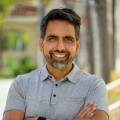
Sal Khan is the founder and CEO of Khan Academy, a nonprofit educational organization that offers free lessons in math, science and humanities, as well as tools for parents, teachers and districts to track student progress. Khan Academy is piloting an AI guide called Khanmigo that is a tutor and teaching assistant. The organization partners with more than 500 public school districts and schools across the United States. Worldwide, Khan Academy has more than 150 million registered users in 190 countries, with free lessons available in more than 50 languages.
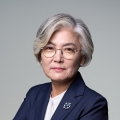
Dr. Kyung-wha Kang, Asia Society President and Chief Executive Officer, is an accomplished diplomat who served as South Korea’s 38th Minister of Foreign Affairs (2017 to 2021)—the first woman appointed to this post in the nation’s history, endeavoring to garner global support for South Korea’s initiative to engage with North Korea towards lasting peace and complete denuclearization on the Korean Peninsula. She previously held key leadership roles at the United Nations, including as Deputy High Commissioner for Human Rights, Deputy Emergency Relief Coordinator and Assistant Secretary-General for Humanitarian Affairs, and Senior Advisor on Policy to Secretary-General António Guterres.
Before joining the United Nations, Dr. Kang held various positions in South Korea’s Foreign Ministry, specializing in multilateral affairs and intergovernmental organizations. Among others, she served as Minister at the Permanent Mission of the Republic of Korea to the United Nations, during which she chaired the 48th and 49th sessions of the UN Commission on the Status of Women. Furthermore, she spearheaded efforts to highlight women with disabilities in the drafting of the UN Convention on the Rights of Persons with Disabilities.
Dr. Kang graduated from Yonsei University in Korea, with a BA degree in political science and diplomacy, and holds MA and PhD degrees from the University of Massachusetts, Amherst in the United States. Her doctorate work was in the field of international and intercultural communication. Dr. Kang served as Distinguished Professor Emeritus from Ewha Womans University and is currently Distinguished Professor at the Institute for Global Engagement & Empowerment, Yonsei University.
Conference Speakers:

Linda Jingfang Cai is a business transformation expert and strategic People Executive with over 20 years of experience in organizational transformation. She currently serves as LinkedIn’s VP of Talent Development. Her main focuses are manager and leadership capabilities in hybrid environment, equitable talent management practices, and an efficient internal talent marketplace that emphasizes career transformation. Prior to LinkedIn, she’s held senior roles in change management, organizational development, and L&D for FSTE 10 and Fortune 300 companies ranging from 30,000 to 280,000 employees. A bilingual global citizen, Linda has worked and lived on three different continents (China, Southeast Asia, the UK and the US). And she is co-author of the book, “Share: How Organizations Can Thrive in an Age of Networked Knowledge, Power and Relationships.” Most importantly, she is a passionate champion of a forward-looking, skills-based approach in talent acquisition, talent pipeline and mobility, and leveraging technology for social good. Linda currently lives in Chicago, Illinois, with her family and enjoys daily reminders from her school-age daughter on how to embrace learning with joy, creativity, and imagination.

Katharine Carruthers is the Director of the Centre for Chinese Language Education at the Institute of Education (IOE), UCL’s Faculty of Education and Society in London. This role includes leading on IOE’s delivery of the UK Department for Education’s Mandarin Excellence Programme. Katharine’s work focuses on developing and supporting the learning of Mandarin Chinese on the mainstream curriculum in schools in England. She is an experienced teacher, teacher-trainer and examiner of Chinese. She is the series editor of the textbooks for teaching Chinese for 11-16 year olds in England and wrote the specification for the Cambridge Pre-U Mandarin Chinese qualification. Katharine teaches on the IOE’s Postgraduate Certificate in Education (PGCE) Languages course (Initial Teacher Training) and on the MA in Intercultural Communication. Her research interests centre around the teaching and learning of Chinese as a foreign language in schools, the notion of intercultural competence in Chinese and UK schools and language policy. Katharine is also UCL’s Global Strategic Academic Advisor (China).

Neelam Chowdhary is the Vice President of Education. In this role, she is responsible for overseeing the department’s strategy and direction for the Center for Global Education, China Learning Initiatives, and Education for Equity programs.
She joined Asia Society in 2011 as the Executive Director of Global Learning Programs, where she led the development and design of global competence curriculum, teacher training programs, and digital content. She specializes in data-driven decision-making centered on research-based teaching and learning.
Before joining Asia Society, Neelam was the Vice President of Programs at the Network for Teaching Entrepreneurship. She co-authored Entrepreneurship: Owning Your Future (2009) and Exploring Careers for the 21st Century (2011). She has experience as an educator in both Los Angeles and New York City public schools and is a National Board Certified Teacher.
Chowdhary earned a doctorate in curriculum studies from Teachers College, Columbia University, a master’s degree from Pepperdine University in education administration, and a bachelor’s degree from The University of Southern California in sociology.

Linda Egnatz is the Executive Director of the Global Seal of Biliteracy, a free international language certification program. She also serves as the 2023-24 President of the Joint National Committee for Languages (JNCL-NCLIS), Bilingualism Matters Advisory Board Member, Global Teacher’s Club Advisory Board Member, and Past President of the Illinois Council on the Teaching of Foreign Languages. Egnatz taught Spanish at the secondary and university levels, and in 2013, received the Golden Apple Award for Excellence in Teaching. In 2014, she was named the ACTFL National Language Teacher of the Year. Egnatz has become known internationally as an advocate for language education. Her work has been featured in Univision and Chicago Tribune interviews and she has widely published, including the Foreign Language Annals, Hispania, The Language Educator, Language Magazine, and Education Weekly. Her mission is to provide bilinguals around the world with resources to level-up and leverage their bilingualism and link to future opportunities to use and grow their skills through language certification.
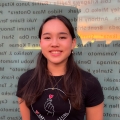
Mina Fedor is a 10th-grade high school student at College Preparatory School in Oakland, CA. She is the Founder and Executive Director of AAPI Youth Rising, the nation’s only AAPI-led national student group founded by middle schoolers that now has 150 chapters spanning 35+ states. AAPI Youth Rising volunteers to teach the ONE DAY OF AAPI HISTORY lesson about Asians in America to classrooms nationwide. The lesson has reached 54,000+ school districts and 300,000 domestic and international teachers through national partnerships. For her work, President Biden honored Mina as one of 16 civilian “Uniters” at the “United We Stand Summit” held in Washington D.C.. Mina is the recipient of the Robert Wood Johnson Health Equity Award: Society for Science Broadcom MASTERS, Time Kid of the Year: Top 5, and the youngest winner of the Princeton Prize in Race Relations. She has provided testimony to The President’s Advisory Commission on AANHPI, The White House Forum on AANHPI, the California Commission on Hate, and more. AAPI Youth Rising is Asia Society Northern California’s Game Changer West Honoree (2023) and was the partner organization to launch American Girl’s first Chinese-American Girl of the Year doll. Mina enjoys following current events, extemporaneous speech, drawing, and exploring the sea.

Giannela "Gi" Gonzales serves as the Project Coordinator and Curriculum Developer for The Asian American Education Project (AAEdu) where she leads a Mellon-funded initiative entitled, "A Fresh Look at APIDA History." In addition, Gi is a CA credentialed K-6 teacher and an alumna of San Diego State University, having received recognition as the top graduate in her program. She is a founding staff member of SDSU's Asian Pacific Islander Desi American (APIDA) Center and is committed to amplifying the voice and visibility of APIDA communities. As a 1.5 generation Filipina American who immigrated from Manila, Philippines to San Diego, CA, Gi is driven by her experiences as an immigrant and champions the teaching of APIDA histories and narratives.
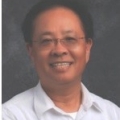
Baocai Jia, MA, is the 2017 recipient of the California Language Teachers Association (CLTA) SWLP Teacher Leader of the Year Award, and the 2019 recipient of CLTA Hal Wingard Lifetime Achievement Award. He has worked at Cupertino High School in California as an AP Chinese teacher and served as the World Language Department Lead. Mr. Jia has served as President and Executive Director of CLASS, Chinese Language Association of Secondary-Elementary Schools. Mr. Jia has participated in various projects in different leadership roles, including as a strand leader in Stanford World Language Project, SWLP. His professional service includes the College Board's World Language Academic Advisory Committee, AP Chinese Language and Culture Exam Development Committee, and the SAT Chinese Subject Test Development Committee. Mr. Jia is on the California World Language Standards Advisory Committee, and has been serving on the California State World Language Project (CWLP) Advisory Board since 2013.
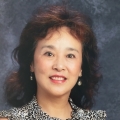
Ying Jin is a passionate and enthusiastic educator of Chinese language and culture with over 20 years of teaching experience in diverse educational settings, including middle schools, high schools, and colleges. She enjoys teaching her adorable Mandarin Chinese students at Cupertino High School in California. She is also a contributing member of Stanford World Language Project’s Leadership Team, where she collaborates with her peers to continuously strengthen their practice in the classroom.
Ying served on the ACTFL (American Council on the Teaching of Foreign Languages) board from 2021-2023. She has also been serving on the board of the Chinese Language Association of Secondary-Elementary Schools (CLASS) since 2015 and was elected President in 2019 and 2022. In 2018, Ying received the highest honor of National Language Teacher of the Year from ACTFL, in 2017 she was awarded Teacher of the Year from SWCOLT (Southwest Conference on Language Teaching), and in 2017 she was recognized as Teacher of the Year from CLTA (California Language Teachers’ Association).
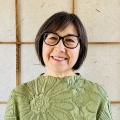
Ann Jordan began her teaching career in the Salinas Valley in the early 1980's and retired from full-time teaching at Los Gatos High School in 2018. She currently serves as chair of the CLTA Advocacy Committee and is a trainer and coach of teachers across the U.S. in the Japanese Language Education Assistant Program (J-LEAP). She is a past president and vice-president of the American Association of Teachers of Japanese and has received the California Language Teachers Association Outstanding Teacher Award as well as recognition as a Santa Clara County Teacher of the Year and the California League of Middle Schools Teacher of the Year. She also served as College Board Advisor on the AP Japanese Language Development Committee and founded the Wasshoi Foundation, a non-profit organization that supports travel/study for financially needy high school students of Japanese.
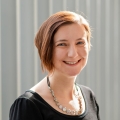
Jennifer Kapral has served Asia Society Texas for five years as the Director of Education, co-leading an 11-million-dollar capital campaign to create Explore Asia, an interactive educational exhibit, and Asia in the Classroom, a digital hub for teaching and learning about Asia and the Asian American experience. Prior to her role at Asia Society, she served for 15 years as a professional educator, school leader, and project manager. She has held leadership roles with Teach for America, Raise Your Hand Texas, and the Houston Independent School District. More recently, she served as Dean of Instruction at the Houston Academy for International Studies, where she built and managed a nationally recognized study abroad program. Highlights from her travels include leading a student service-learning trip to Pune, India and receiving a Fulbright-Hays award to study curriculum development in Egypt. Jennifer holds a B.A. in Politics and Philosophy from the University of Pittsburgh and a Master’s in Education from The University of St. Thomas.

Ren Li holds a Master of Arts in Teaching (MAT) degree from the esteemed Tufts University Education Department. She is the first permanent Chinese language teacher at Brockton High School in Massachusetts, and she also serves as a K-12 board member of the New England Chinese Language Teacher Association and is a valuable board member of the American Society of Shufa Calligraphy Education. In her teaching practices, she seamlessly integrates Chinese calligraphy into her regular Chinese language classes, creating a rich and immersive learning experience for her students. She also teaches Pre-AP, MLP Chinese and calligraphy classes at weekend schools in Massachusetts.
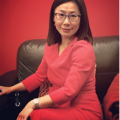
Shenzhan Liao is the Senior Vice President of Education and Head of the School of Chinese Studies at China Institute. She oversees all educational programs and classes in Chinese language and culture at China Institute. Ms. Liao designs, moderates, and produces online and onsite programs on a variety of topics including poetry read-aloud program Lunch and Learn, Music Chat, China Institute Literati Salon for the general public, as well as programs for K-12 educators on a variety of topics including mythology, history, art, and education.

Christopher M. Livaccari is the Head of Presidio Knolls School, and an educator, author, and former US diplomat who served in Tokyo and Shanghai as a Vice Consul, Deputy Press Attaché, and as Deputy Director of the Tokyo American Center. He was previously the Senior Advisor for China Learning Initiatives in Asia Society’s Center for Global Education in New York, the Chinese Program Director at Silicon Valley International School in Palo Alto, and a member of the board of trustees of Chinese American International School in San Francisco.
Chris is the author of New Ways of Seeing: How Multilingualism Opens Our Eyes and Trains Our Minds for a Complex World, and co-author of Structures of Mandarin Chinese for Speakers of English I & II, Chinese Language Learning in the Early Grades, and the Chinese for Tomorrow series, among many essays and articles on language, education, and culture. He has been a featured speaker at the Aspen Ideas Festival, has spoken on Chinese language education at the British Museum in London, and was the recipient of the U.S. State Department’s Meritorious Honor Award, citing outstanding speeches written for two U.S. ambassadors to Japan. In 2022, he received a Kellogg Foundation grant, “in recognition of [his] work building understanding and leadership in US-China relations, and helping educate the next generation of US-China leadership.”
He studied modern Chinese, Japanese, Korean, & Russian literature at Columbia University; Classical Chinese, Japanese, Korean, & Sanskrit literature at the University of Chicago; and applied linguistics at New York University.
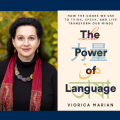
Dr. Viorica Marian is a cognitive scientist at Northwestern University, where she is the Sundin Endowed Professor of Communication Sciences and Disorders and of Psychology and the Director of the Northwestern Bilingualism and Psycholinguistics Research Lab. Her research centers on the relationship between language and mind, with a focus on the psycholinguistics of bilingualism and multilingualism and the cognitive, developmental, linguistic, neural, and social consequences of knowing more than one language. Dr. Marian received her PhD in Psychology from Cornell University and previously served as Chair of the National Institutes of Health Study Section on Language and Communication and as Chair of the Northwestern University Department of Communication Sciences and Disorders. She is the recipient of the American Association for the Advancement of Science 2024 John P. McGovern Award, the Clarence Simon Award for Outstanding Teaching and Mentoring, the University of Alaska Alumni of Achievement Award, and the Editor’s Award for best paper from JSLHR. Marian is the author of over 200 articles and her new popular science book “The Power of Language” is being translated into 12 languages and counting.

Jonathan McKay (米凯) has spent his career driving growth and building teams at organizations changing the world. At OpenAI, he is the Head of Product Growth to expand the user base and revenue of ChatGPT. Formerly a Sr. Product Director at Instagram and Facebook, he founded over 18 teams, including the information operations team responsible for combatting information operations for Facebook. He is fluent in Chinese, rusty in Arabic and Java, and has founded a real estate company now managing over $50m in assets.

Eddie Park is the Director of Global Languages and Innovative Programs in the Poway Unified School District in San Diego. Park is a forward-thinking figure in education who led the revitalization of a struggling San Diego school, elevating it to a prestigious institution through the groundbreaking Mandarin Immersion Program he pioneered in 2007. His exceptional leadership earned him distinguished recognitions, including the California Distinguished School title and the School of the Year award from the Magnet Schools of America. Replicating his success, he introduced another Mandarin Immersion Program at Adobe Bluffs Elementary School in 2015, which went on to secure the Gold Ribbon School Award, the Blue Ribbon School Award, and the Impact Award from the Classroom of the Future Foundation for Innovation. As the Director of Global Languages and Innovative Programs for Poway Unified School District, Eddie draws upon his extensive three-decade educational background, with 15 years of experience as a principal, to advocate for language diversity and progressive education. His pioneering WongAvery Global Languages and Culture Program has positively impacted over 20,000 elementary students by introducing them to a variety of languages. This initiative recently garnered another prestigious accolade for Innovation from the Classroom of the Future Foundation in 2024. Eddie's commitment to language education and cultural exchange is further underscored by his role as the chair of the API Special Interest Group and his position as the Korean Language Ambassador at the National Association of Bilingual Education, highlighting his dedication to fostering global understanding and appreciation.

Margaret Peterson is the Executive Director of the California World Language Project (CWLP) in the Graduate School of Education at Stanford University. CWLP is dedicated to developing the linguistic, intercultural, and global competency skills in each and every student in order to create a more inclusive society based on mutual respect, empathy, and a commitment to equity. An educator for 30 years, she has been a teacher of Japanese, Curriculum Developer and Coordinator for a Japanese Bilingual Bicultural Program, Administrator in the Multilingual Department of San Francisco Unified School District, Assistant Principal of the largest high school in San Francisco, lecturer at Sophia University in Tokyo, Japan, and Director of the Stanford World Language Program. Her areas of research include social justice and social emotional learning in multilingual settings, global citizenship, seal of biliteracy, and dual language immersion. She has published articles in peer reviewed journals on the social emotional wellbeing of students and teacher leaders, multiliteracy in California, and professional development career pathways for language teachers.

Emily Reid is a dynamic leader in AI education and responsible AI, dedicated to promoting diversity and responsible AI frameworks in the tech industry. As the CEO of AI4ALL, she is democratizing pathways to AI careers and creating opportunities for historically excluded AI Changemakers. Emily is passionate about making AI work for humans, and believes that AI should be created by an ethics-informed, representative workforce. With a fresh perspective and a focus on impact and responsible AI, she is leading the charge to cultivate a new generation of AI Changemakers who will steer AI in the right direction.
Previously, Emily was the VP of Open Learning at AI4ALL, a program that brought AI education to more than 4,000 students in over 850 classrooms in 48 states and the District of Columbia. Emily was also the founding Director of Education at Girls Who Code, leading a team that taught over 30,000 girls to code and trained over 2,000 computer science educators. Before Girls Who Code, Emily was a Senior Cyber Security Engineer at the MITRE Corporation and has published research in artificial intelligence and cybersecurity. Emily holds an M.S. in Computer Science from Columbia University and a B.S. in Mathematics from Tufts University.
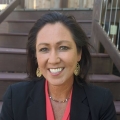
Yvette Renteria is the Chief Program Officer for Common Sense Media. She leads the education, research, family and community engagement teams that support our kids to thrive in a digital world. Yvette brings 20 years of experience working in schools and non profit organizations. Within her years in education, she was the Deputy Chief of Innovation on the district level, school principal and elementary school teacher for several years. Yvette has also worked in nonprofit spaces as a Program Director for a workforce development organization and and Chief Strategy Officer for an early childhood development organization. The focus of her career has always been about access, opportunity and growth for people. Yvette holds a Masters of Education from Loyola Marymount University and Bachelors of Development Studies from UC Berkeley. In her free time, she enjoys exploring life through the eyes of her 7-year old twins.
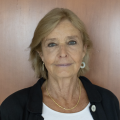
Madelyn Ross has worked in China-related positions in higher education and non-profit organizations for 30 years. She became president of the US-China Education Trust in March 2022. Before coming to USCET she was executive director of SAIS China and associate director of China Studies at Johns Hopkins University School of Advanced International Studies, which included oversight of the Hopkins-Nanjing Center partnership in China and the SAIS dual degree program with Tsinghua University. She worked at George Mason University from 2003 to 2015, becoming director of China Initiatives across the university. She also spent nine years at The US-China Business Council, as editor of The China Business Review and executive director of The China Business Forum. Ross holds an M.A. in International Affairs from Columbia University and a B.A. in East Asian Studies from Princeton University, magna cum laude. She did graduate work in Chinese at Fudan University in Shanghai in 1979-1980, where she was one of the first American students to study in China following normalization of US-China relations. She has lived and worked in Beijing, Hong Kong, Shanghai, and Taipei.

Zhongqi Shi is currently serving as the President of the Chinese Language Teachers Association-USA (CLTA). Dr. Shi offers visionary leadership and guidance, shaping the trajectory of Chinese language education nationwide. Holding a Ph.D. from Teachers College, Columbia University, Dr. Shi has dedicated his distinguished career to advancing second language acquisition, harnessing instructional technology, and fostering proficiency in business Chinese to facilitate career advancement. With two decades of teaching at Columbia University, Dr. Shi has authored acclaimed textbooks widely adopted across the United States and China. Notably, he spearheaded Columbia's pioneering Business Chinese and Internship program in Shanghai from 2008 to 2016, providing students with invaluable immersive experiences in Chinese business culture while honing advanced language proficiency.
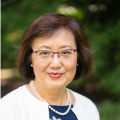
Shuhan C. Wang, Ph.D. (王周淑涵) is the President of ELE Consulting International, LLC, in which she provides technical assistance, teacher professional development, curriculum, material, and assessment development, and program evaluation to parties interested in language education. She is also the Director of the Chinese Early Language and Immersion Network (CELIN) at the Asia Society.
Dr. Wang has held a variety of prominent positions in language education, including as former Deputy Director of the National Foreign Language Center (NFLC) at the University of Maryland and as Co-Principal Investigator of the STARTALK Project. She was the Executive Director for Chinese Language Initiatives at the Asia Society, Education Associate for World Languages and International Education for the State of Delaware, and President-Elect for the National Council for the State Supervisors For Languages and the National Association of Chinese Heritage Language Schools. She has been serving as an advisor to the Ministry of Education in Singapore on the Mother Tongue and Chinese Primary Curriculum Projects since 2012. Presently she is an advisor to the Confucius Institute U.S. Center and the Hunter College Chinese K-16 Language Flagship Pipeline Project, and co-editor of a series of CELIN Briefs published by the Asia Society.
Her experiences of teaching in K-12, heritage language schools, universities, and teacher preparation programs have deepened her understanding of a wide range of issues from establishing to sustaining effective language programs and staffing. Among the numerous schools, school districts, immersion programs, international schools, and state governments, Dr. Wang has collaborated with the Center for Applied Linguistics, North Carolina Online Mandarin Program, the Maryland Elementary World Language-STEM Curricular Modules and Elementary Language Teacher Development, the Sesame Workshop Mandarin Project, and the Delaware Chinese Dual Language Immersion Programs. She has co-authored several textbooks, including Flying with Chinese, a series of standards-and performance-based learning system for K-6 learners and a high school textbook. In recent years, she has also led a group of experts to develop a culture history-based curriculum for K-12 learners for Ross Institute, New York. Her work has been published in books and peer-reviewed journals. She is also highly sought after as a speaker for workshops or conferences nationally and internationally. Dr. Wang received her BA in Foreign Languages and Literatures from National Taiwan University, an MA in Communication from Ohio State University, and a second MA in Bilingualism/TESOL from the University of Delaware. She received her PhD in Educational Linguistics from the University of Pennsylvania.
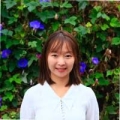
Wenting Wang is the Director of Academics at Yu Ming Charter School. She has held several positions since joining the Yu Ming team in 2016. At Yu Ming she has served as a classroom teacher, Teacher Leader, and teaching intern program supervisor after teaching in multiple Chinese Immersion programs in Michigan. Wenting earned two Bachelor’s Degrees in English Teaching and Human Resource Management from ChongQing Normal University and a Master’s degree in Teaching and Curriculum from Michigan State University. She holds a California Clear teaching credential and is now currently enrolled in the California Administrative Credentialing program at Reach Institute. Wenting then served the Yu Ming community as Assistant Principal before transitioning to her Director of Academics role.

Jacob Ward is a prolific technology journalist. He was formerly an on-air correspondent for NBC News, covering the intersection of technology, human behavior, and social change for Nightly News, The TODAY Show, and MSNBC. He is the former editor-in-chief of Popular Science magazine, and was Al Jazeera’s science and technology correspondent from 2013 to 2018. Ward is a lecturer at the Stanford d.school, and was a 2018-2019 Berggruen Fellow at Stanford University’s Center for Advanced Study in the Behavioral Sciences, where he began writing The Loop: How AI is Creating a World without Choices and How to Fight Back, out now from Hachette Book Group. The book explores how artificial intelligence and other decision-shaping technologies will amplify good and bad human instincts. Ward has written for The New Yorker, The New York Times Magazine, Wired, and many other publications. In addition to hosting documentaries for Nat Geo and Discovery, he’s the host of the landmark four-hour PBS television series, “Hacking Your Mind,” about human decision-making and manipulation.

Christie YoungSmith is Director of Programs for Asia Society Northern California. Bringing a strong base in education and research, Christie has led program and professional development, curriculum design, and decolonial research efforts at the Stanford Center for the Support of Excellence in Teaching (CSET) and American University’s Antiracist Research & Policy Center. Previously she taught in International Baccalaureate (IB) and dual-language schools in Hong Kong, Shanghai, and the Bay Area. Christie is of mixed-Chinese descent. She received her M.A. from Stanford Graduate School of Education, her B.A. from Johns Hopkins University, and is pursuing her Ed.D. in Education Policy & Leadership with American University. Christie also has experience with museum education and curation, having worked at the Baltimore Museum of Art, the Smithsonian’s National Museum of Asian Art, and the Cantor Arts Center at Stanford University.
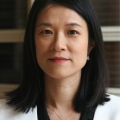
Jie Zhang is Associate Professor of Chinese Pedagogy and Applied Linguistics in the Department of Modern Languages, Literatures, and Linguistics at the University of Oklahoma, USA. She received her Ph.D. in Applied Linguistics from the Pennsylvania State University. Her research interests are second language acquisition, foreign language pedagogy, and Chinese as a second language. She has published on the Modern Language Journal, Language Testing, Language Teaching Research, Chinese as a Second Language, Teaching Chinese in the World, among others. She is co-editor of the volume Chinese Language Education in the United States (Spring, 2016). Dr. Zhang serves as the Executive Director of The Chinese Language Teachers Association, USA (CLTA-USA). She had served as President of Oklahoma Chinese Language Teachers Association, Board Member of the CLTA-USA, as well as Board Member of the Oklahoma Foreign Language Teachers Association. She is on the editorial board of the journal Language and Sociocultural Theory. She is an ACTFL Oral Proficiency Interview Tester of Chinese with Full Certification.
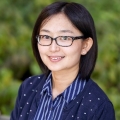
Ting Zhang holds two master’s degrees in teaching Chinese as a Second Language. She has been a Chinese teacher for 12 years. In addition to teaching in private and public K-12 schools, she taught in the Middlebury Summer Chinese Program and STARTALK at Hamilton College. Currently, she serves as a high-school Chinese teacher on the West Coast. In 2015, she launched the first Chinese immersion program in her previous public school district. Moreover, she has presented her work on the learner’s portfolio at ACTFL, remote teaching reflections at NECLTA, and her research on the fourth-tone errors at CLTA-GNY.
CLASS Teachers Swapshop
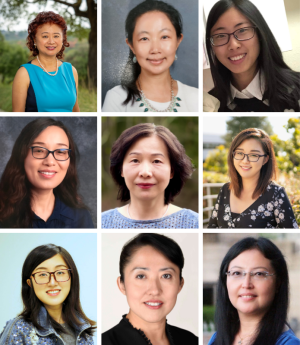
- Hai Zheng Olefsky, Associate Director of International Program, St. Stephen's Episcopal School, TX
- Yanan Vrudny, Chinese Teacher, Henry M. Gunn High School, CA
- Jing Zhou, Mandarin Chinese Teacher, Sewickley Academy, NC
- Xinjia Xia, Mandarin Teacher, Piedmont High School & Piedmont Middle School, CA
- Jingyi Bian, Elementary Mandarin Immersion Teacher, Ontario-Montclair School District, CA
- Freya Li, Chinese Teacher, Fremont Union High School District, CA
- Jie Bai, Teacher, Cupertino High School, CA
- Bernice Wei, Mandarin Teacher, Los Altos High School, CA
Thank you to our sponsors
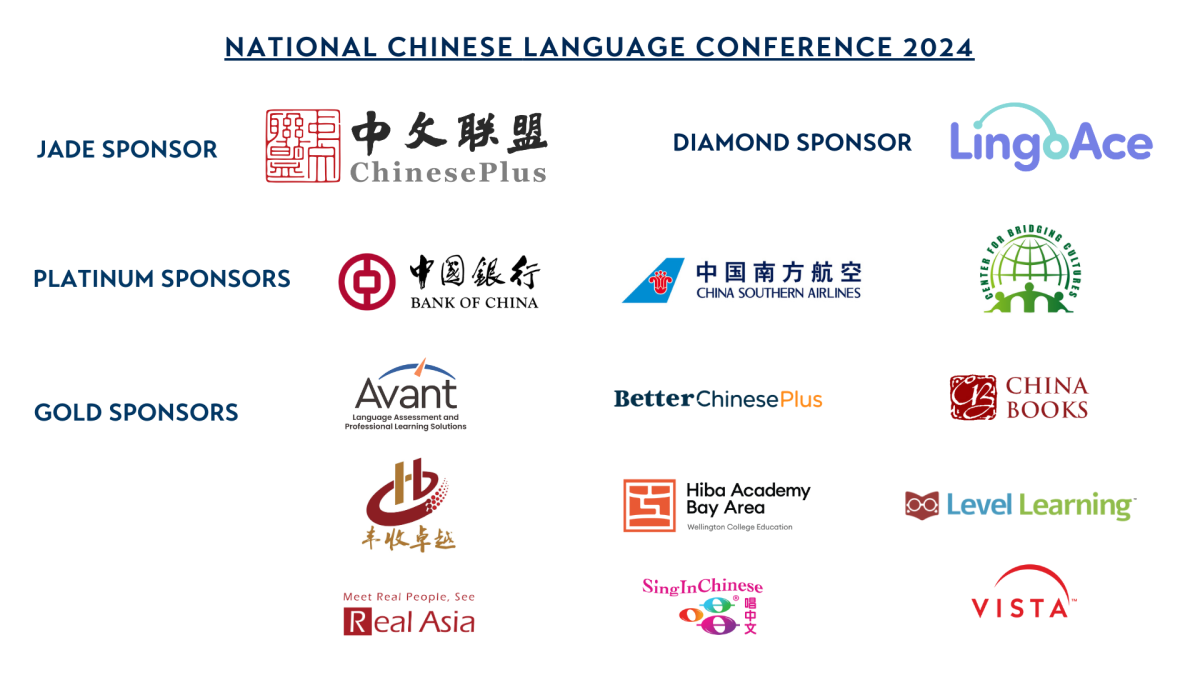
Event Details
Computer History Museum
1401 N Shoreline Blvd, Mountain View, CA 94043
